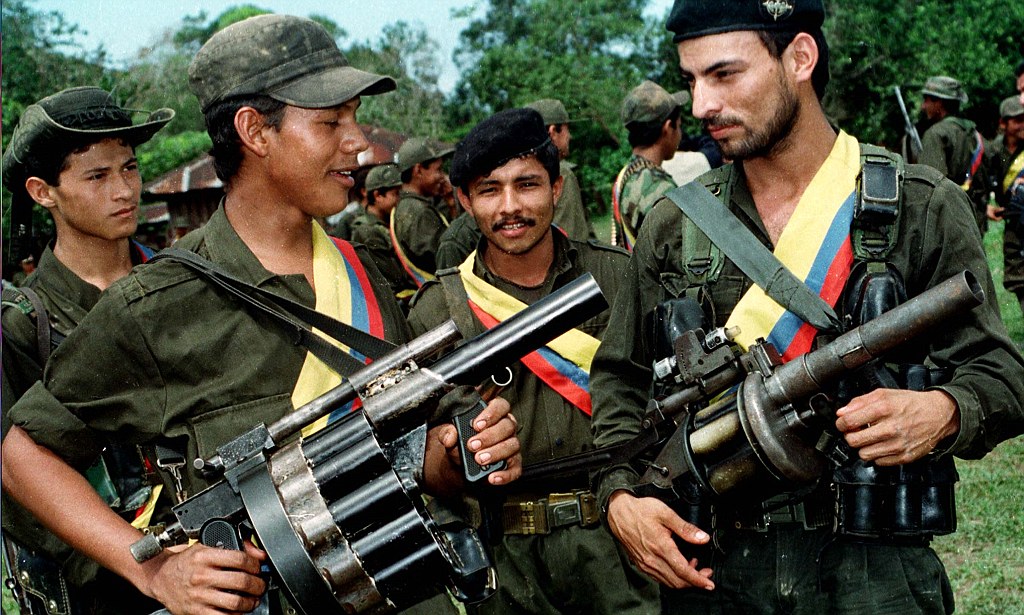The FARC’s announcement last Sunday that the organization will no longer kidnap civilians was a surprise to most observes and experts of the region. The mainstream media has reported on the event, but has been unsuccessful at explaining why the FARC would do this. In the past 48 hours, online media and blogs have filled this void, providing analysis and discussion on the announcement. Many observers of the region have tried to reverse engineer the thought process of the FARC’s Secretariat that may have led to the statement, coming up with different results:
–James Bosworth, the author of Bloggings by Boz, suggests that the FARC may be responding to Venezuelan President Hugo Chávez’s illness. Chavez is scheduled to have cancer-related surgery this week in Cuba, causing speculation of the future of Venezuela’s leader. Bosworth argues the FARC leadership may be concerned about how they would survive in a post-Chávez world, and are therefore opening up opportunities for negotiations with the Colombian government.
–Juanita León and Dora Montero Carvajal in La Silla Vacía, Colombia’s growing online news and analysis outlet, argue that the FARC’s announcement was long in the making. They suggest that NGOs had long pressured the FARC to change its policies, and that Alfonso Cano, the FARC’s leader until he was shot dead by military forces last November, had agreed to make this change before his death. Timochenko, who replaced Cano as the FARC’s leader, was committed to making this announcement. The statement posted on the FARC’s website on Sunday is signed by the entire Secretariat, a group of 27 members, León and Carvajal point out, suggesting a strong backing for its content. In terms of what is behind the FARC’s position, León and Carvajal point toward a division among the FARC’s leaders. While some are interested in eventually negotiating with the government, others are leaning at the moment toward demonstrating greater force against the government. Both sides agreed on ending the taking of hostages because both believe doing this supports their strategy.
–Steven Dudley of Insight Crime suggests that the decision is simply “cold economic calculus.” The military’s pressure on the FARC has made it challenging for the organization to carry out successful kidnappings, and as a result kidnappings are no longer a significant source of revenue. The organization raises between US$200 million and US$600 million yearly from taxing drug producers and traffickers, but only about $350,000 from kidnappings, Dudley calculates. If anything, kidnappings have isolated the FARC from some of its followers, and are no longer important for the organization’s finances. As a result, it makes simple economic sense for the organization to quit this practice. In La Silla Vacia, Román Ortíz makes a similar argument.
—-
What do I think?
The FARC’s decision demonstrates that something worked in pressuring the FARC to change its strategy. There has been a lot of pressure on the FARC, though, and it is difficult (perhaps impossible) to know which factor played the most important role. Steven Dudley’s argument about the FARC’s economic decision makes a lot of sense to me. Dudley believes a lot of this has to do with the armed forces’ military pressure on the FARC–which I am sure is felt. I wonder if within this economic calculus one could also include the impact of the massive civic protests against the FARC, and particularly kidnapping, that have taken place in the last decade. If the FARC values the populations’ support, then the marches and protests may have had an impact. If this is in fact the case, this would be a fabulous case study of a successful civic movement.
I am not convinced with the argument that this is related to last weeks’ turn in Chávez’s illness, as I can’t imagine the entire FARC Secretariat coming together on such an important agreement in a short time period. I also believe there are many more variables at stake. The changing relationship between Venezuela and Colombia that President Santos has fostered, though, must have had a negative impact on the FARC’s perception of its own security in the region in the past year. Venezuela and Colombia have signed security agreements since Santos came to power. The Venezuelan government has extradited suspects wanted by Colombia, and arrested Joaquin Pérez Becerra (more on Pérez Becerra here) in 2011. All of this does not bode well for the FARC, for which Venezeula has been a safe haven at times. I would not be surprised if shifting regional dynamic had an impact.
At the moment, one can only speculate about the reasons behind the FARC’s decision. Perhaps more important than the reasons behind the statement is whether the new policy will actually be implemented, and the impact it will have. History offers good reasons to be skeptical about implementation of the FARC’s new policy. In the released statement it is not clear what will happen to the hundreds of hostages that are currently being held. Many have also pointed out that the FARC did not renounce laying land mines, recruiting children, or extorting civilians and businesses. It is hard to imagine how the organization will continue to extort without kidnapping. Both activities seem to be intrinsically related. Some expect other types of violence to increase. The past 48 hours suggest this is true. Tracking violence statistics will be important in the next few months to understand what is going on.

Reply